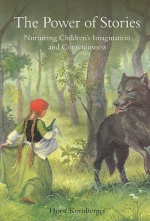Traditional Stories as an Educational Psychology Tool
November 06, 2021
Quote of the Week
"There's always room for a story that can transport people to another place." - J.K. Rowling
Traditional Stories As An Educational Psychology Tool
 Research says that stories evoke emotions, change our attitudes and behaviors. “Narrative transportation” is an interaction of language and imagination that makes the listener deeply engage with the narrative. Listeners get simulated experiences and this transportation makes them lose a sense of “here and now” as their thought process dwells in the times narrated in the stories.
Research says that stories evoke emotions, change our attitudes and behaviors. “Narrative transportation” is an interaction of language and imagination that makes the listener deeply engage with the narrative. Listeners get simulated experiences and this transportation makes them lose a sense of “here and now” as their thought process dwells in the times narrated in the stories.
The Itihaasa and Puraana are a huge body of knowledge for stories in India. They bring out cosmology, evolutionary biology, time scales, genealogy and historical narratives. Not only do these traditional stories, like the ones from Mahabharata and Ramayana purify the mind and emotions, they also bring scientific rigor and a spirit of inquiry. [Read More]
Reading Corner
 Title: The Power of Stories: Nurturing Children's Imagination and Consciousness
Title: The Power of Stories: Nurturing Children's Imagination and Consciousness
By: Horst Kornberger
For: Educators and Parents
From the great myths and legends to enchanting fairy tales, parables, fables and folk tales, stories can have a great healing and educative power. They come from our subconscious and imagination, deep inside us. They have much to teach us about ourselves, therefore, and the world we create around us.
Horst Kornberger, a writer, artist and Steiner-Waldorf teacher, first explores the power of particular stories such as Odysseus, Parsifal, Oedipus, Bible stories and fairy tales. He then explains how to apply that power to help a child develop, or to heal and transform a child with difficulties.
Finally he discusses the art and practicalities of creating new stories to help children with particular needs, and shows storytelling to be a universal gift that we can use to benefit those around us. This is a fascinating and inspiring book for teachers, parents and caregivers of children, as well as creative writers and students of literature.
Be the Change
Think of a story that took you in a "different world" when you heard it. Share that story with someone who hasn't heard it before. Observe what effect it has on you and the listener when you narrate this story.





